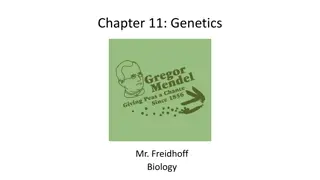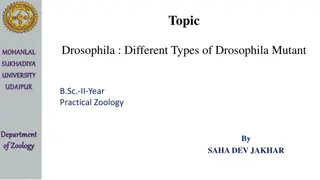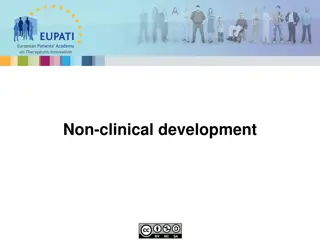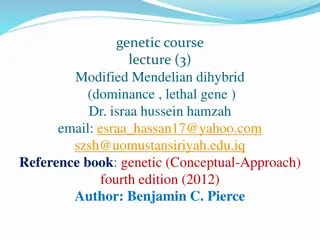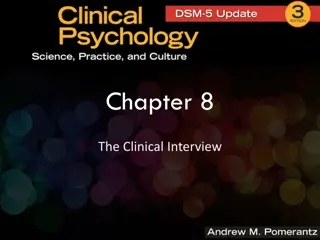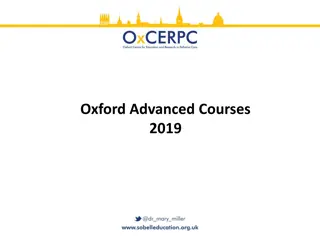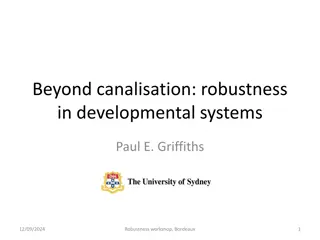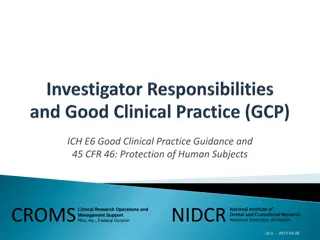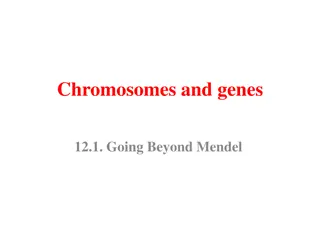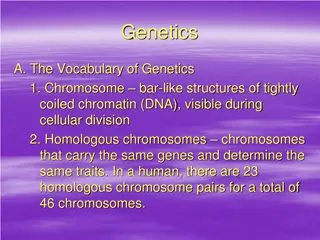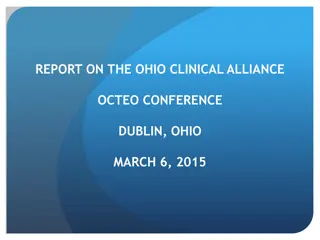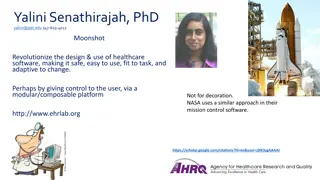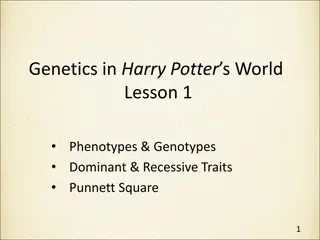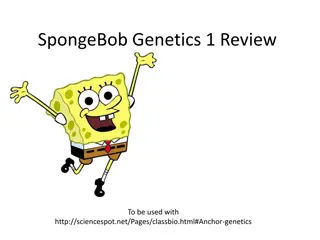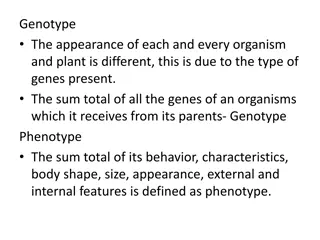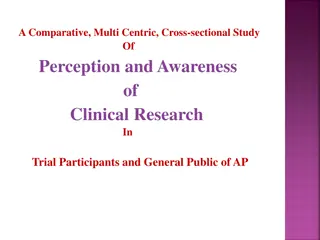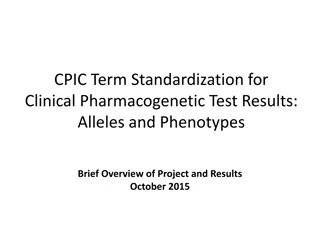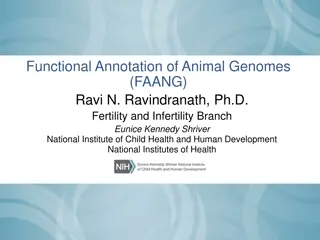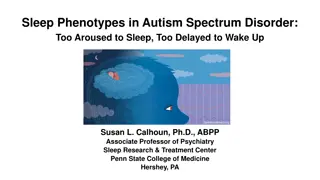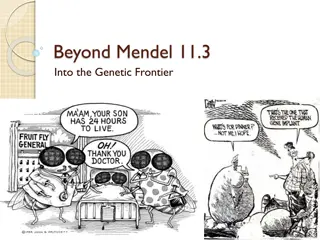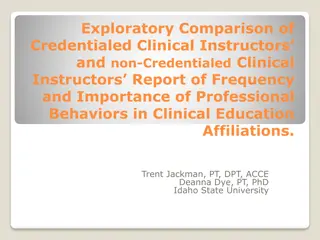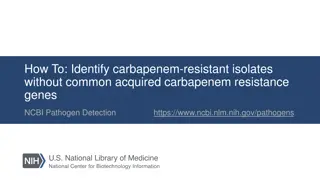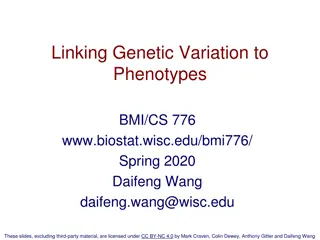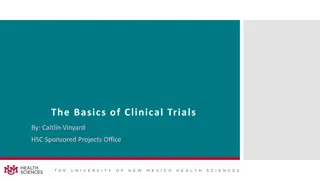India Alliance Clinical & Public Health fellowship in India
India Alliance Clinical & Public Health fellowship in India\n\nIndia Alliance Clinical and Public Health Research Fellowships are for Health researchers with an MD, MS, MPH, or an equivalent clinical or public health degree, who can apply for the DBT\/Wellcome Trust India Alliance Clinical and Publi
0 views • 5 slides
Understanding Genetics: A Comprehensive Overview
Genetics is the study of genes, heredity, and variation in living organisms. This chapter explores key concepts such as phenotypes, genes, alleles, genotypes, and the laws of dominance. Through Punnett squares, the inheritance patterns of traits can be predicted, shedding light on how traits are pas
1 views • 35 slides
Ethical Issues in Clinical Pharmacy Research by Dr. Haider Raheem Mohammad
Research ethics play a crucial role in clinical trials and therapeutic research in the field of pharmacy. From discovery to validation, all medicines undergo rigorous evaluation processes to ensure safety, efficacy, and freedom from adverse effects. Clinical trials in both animals and humans are ess
0 views • 20 slides
Understanding Incomplete and Co-dominance in Genetics
Phenotypes and genotypes play crucial roles in understanding incomplete dominance and co-dominance. In incomplete dominance, alleles blend to produce a new phenotype, while in co-dominance, both alleles are expressed equally. Examples and problems illustrate these concepts further, aiding in genetic
0 views • 12 slides
Advanced Clinical Practice Framework and Pillars of Practice
The document discusses the advanced clinical practice framework and the four pillars of practice which include leadership & management, clinical practice, education, and research. It emphasizes the importance of core capabilities and area-specific competence in advanced clinical practice. The role o
2 views • 8 slides
Objective Structured Clinical Examination (OSCE): A Modern Approach to Assessing Clinical Competence
The Objective Structured Clinical Examination (OSCE) is a modern examination method widely used in the field of health science to evaluate clinical skill performance. It involves stations where medical students interact with simulated patients to demonstrate competencies such as history taking, phys
1 views • 40 slides
NIMH Clinical Research Education and Monitoring Program Overview
NIMH's Clinical Monitoring and Clinical Research Education, Support, and Training Program (CREST) aims to ensure the proper conduct, recording, and reporting of clinical trials. This program includes clinical monitoring plans, guidelines for site monitoring activities, and independent clinical monit
1 views • 29 slides
Exploring Different Types of Drosophila Mutants at Mohanlal Sukhadiya University
Discover the various Drosophila mutants, including Yellow Type, Ebony, Orange-eye, White Eye, Eyes Absent, Leg-headed, and Curly Wings, with unique genetic characteristics and visible phenotypes. This practical Zoology insight provides an in-depth look into mutations affecting body color, eye pigmen
0 views • 11 slides
Understanding Non-Clinical Development in Therapeutic Innovation
The European Patients Academy on Therapeutic Innovation focuses on the non-clinical development phase of medicine, delving into efficacy assessment, safety evaluation, and manufacturing process considerations. Non-clinical studies are essential for decision-making in clinical trials, marketing appli
1 views • 26 slides
Understanding Multiple Alleles in Genetics
Explore the concept of multiple alleles in genetics through examples like pea color inheritance and human blood types. Learn how multiple alleles create various phenotypes and genotypes, illustrating concepts of dominance, recessiveness, and co-dominance in genetic inheritance.
0 views • 15 slides
Unlocking the Clinical Significance of Alloimmunization in Transfusion Medicine
Alloimmunization, a critical side effect of transfusion, has been a challenge in matching phenotypes and genotypes globally. The detection of clinically significant antibodies requires a delicate balance between sensitivity and specificity, considering various controllable and uncontrollable variabl
0 views • 20 slides
Understanding Dominance in Genetics: The Role of Alleles and Phenotypes
Dominance in genetics refers to the interaction of alleles at the same gene locus. Complete dominance occurs when one allele masks the effect of another in a heterozygous genotype, leading to a phenotype indistinguishable from the dominant homozygote. This concept is crucial for predicting genetic o
1 views • 18 slides
Understanding Evidence-Based Medicine and Clinical Decision-Making
European Patients Academy on Therapeutic Innovation emphasizes the importance of Evidence-Based Medicine (EBM) in providing optimum clinical care. EBM involves systematic review and utilization of clinical research for informed decision-making, benefiting patients in disease management and treatment
7 views • 20 slides
Essential Aspects of the Clinical Interview in Psychology
Clinical interviews play a crucial role in the assessment conducted by clinical psychologists, showcasing essential qualities like validity, reliability, and clinical utility. Understanding the importance of feedback and honing general and specific skills as an interviewer are key components in cond
1 views • 17 slides
Cutting-Edge Insights on Pain Management and Rehabilitation Strategies
Gain valuable knowledge on topics ranging from neuropathic pain and neuroinflammation to rehabilitation models and advanced pain management medications like Gabapentin. Discover insights on pain phenotypes, trauma pathways, and the importance of personalized goal setting in rehabilitation. Stay upda
0 views • 14 slides
Exploring Robustness and Developmental Systems: A Workshop Overview
Delve into the intricate world of developmental systems and robustness with insights from Paul E. Griffiths. Discover the evolution of developmental processes, the significance of epigenetics, and the interplay between genotypes and phenotypes. Gain a deeper understanding of epigenetic inheritance a
0 views • 17 slides
Understanding Bikini Bottom Genetics: Predicting Traits and Probabilities
Delve into the genetics of SpongeBob's world as we explore allele combinations, phenotypes, and probabilities in predicting traits for SpongeSally, SpongeBillyBob, and other citizens of Bikini Bottom. From body shape to eye shape, uncover the genetic makeup behind Squarepants and Roundpants in this
0 views • 15 slides
Understanding Punnett Squares for Predicting Offspring Genotypes
Punnett squares are a visual tool used to predict the possible genotypes and phenotypes of offspring based on the parent's genetic makeup. By following simple steps and understanding dominant and recessive traits, you can calculate the likelihood of different genetic outcomes for traits like hair co
0 views • 7 slides
Clinical Research Guidelines and Regulations Overview
Clinical research encompasses various guidelines and regulations to ensure the protection of human subjects and the credibility of study results. Key aspects include Good Clinical Practice (GCP) standards, Title 45 of the Code of Federal Regulations (CFR) Part 46, and additional CFR sections for cli
0 views • 46 slides
Understanding Genetic Inheritance: Going Beyond Mendel
Exploring genetic inheritance beyond Mendel's principles, this content delves into topics like incomplete dominance, codominance, pleiotropy, epistasis, and multiple alleles. Discover how genes interact to shape phenotypes and learn about interesting genetic phenomena like Marfan syndrome and the AB
0 views • 20 slides
Understanding Genetics: Chromosomes, Genes, and Inheritance
Genetics encompasses the study of chromosomes, genes, and inheritance patterns. Chromosomes are bar-like structures carrying DNA, with homologous pairs determining traits. Autosomes and sex chromosomes play roles in genetic makeup. Genes are hereditary units determining individual traits, with allel
0 views • 20 slides
Ohio Clinical Alliance: Transforming Clinical Experiences
The Ohio Clinical Alliance, through collaborative partnerships, aims to enhance clinical preparation for educators. The leadership team comprises various representatives and organizations committed to improving student learning. Their activities include retreats and meetings to ensure effective comm
0 views • 27 slides
Revolutionizing Healthcare Software Design and User Control
Moonshot to revolutionize healthcare software design, making it safe, easy to use, and adaptable. The approach involves modular platform control for users, inspired by NASA's mission control software. The MedWISER model aims for clinician-driven, composable architecture in healthcare systems. Focus
0 views • 8 slides
Understanding Genotype and Phenotype in Hereditary Traits
Exploring simple heredity through predicting and modeling phenotypes of Crazy Creatures, students are tasked with contrasting genotype and phenotype. The Crazy Traits lab data table is essential for recording alleles and genotypes, aiding in determining phenotypes for 14 different traits. By complet
0 views • 4 slides
Understanding Genetics in Harry Potter's World
Explore the inherited genetic traits in the Harry Potter series, including phenotypes and genotypes of characters like the Weasleys, Draco Malfoy, and Harry Potter. Delve into observable traits like freckles, hair color, eye color, and height, and learn how to apply genetics concepts through example
0 views • 29 slides
Genetics Practice: Dog and Flower Color Inheritance
Explore genetics through practice questions on dog coat color inheritance and flower color inheritance. Answer correctly to progress and learn more about genotypes and phenotypes.
0 views • 43 slides
SpongeBob Genetics Review Questions & Phenotype Determination
Explore genetics concepts using SpongeBob-themed questions to differentiate between heterozygous and homozygous genotypes, identify purebred and hybrid genotypes, and determine phenotypes based on dominant and recessive traits like body color and shape.
0 views • 17 slides
Understanding Genotype and Phenotype: The Genetic Basis of Organism Variation
Genotype determines the genetic makeup of an organism, while phenotype encompasses its observable traits. Johannsen's theory states that phenotype is a result of genotype, which remains constant throughout life. The concept of phenocopy refers to mimicking another phenotype without altering the geno
0 views • 15 slides
Perception and Awareness of Clinical Research in Trial Participants and the Public of Andhra Pradesh
This study focuses on understanding the perception and awareness of clinical research among trial participants and the general public in Andhra Pradesh. It highlights the importance of creating awareness about clinical research, previous study results, public attitudes towards clinical trials, and e
0 views • 24 slides
Standardization Project for Clinical Pharmacogenetic Test Results
This project aimed to standardize the terms used to describe pharmacogenetic allele function and clinical phenotypes to improve clarity for clinicians and patients. Through a modified Delphi process involving expert panels, a consensus was reached on final terms and definitions for allele functional
0 views • 11 slides
Importance of Functional Annotation of Animal Genomes in NIH Research
Functional Annotation of Animal Genomes (FAANG) is crucial for associating sequence variation with quantitative phenotypes in domestic animals, serving as important models for human health, disease, and ecology. The NIH actively participates in various genome projects involving cattle, horses, and c
0 views • 10 slides
Understanding Sleep Phenotypes in Autism Spectrum Disorder
Sleep disturbances in individuals with Autism Spectrum Disorder (ASD) vary from delayed sleep onset to difficulties waking up. Lack of proper sleep exacerbates core ASD symptoms and affects overall well-being. The importance of addressing sleep health in ASD is highlighted, as chronic sleep disturba
0 views • 26 slides
Understanding Genetic Inheritance Patterns and Human Blood Types
Explore how genes can be inherited based on patterns such as Mendel's dominance, incomplete dominance, co-dominance, and multiple alleles. Dive into the complexities of human blood types controlled by one gene with three alleles - A, B, and O, resulting in four phenotypes and six genotypes. Learn ho
0 views • 19 slides
Comparison of Professional Behaviors in Clinical Education
Professional behavior characteristics play a crucial role in enhancing student learning during clinical education. This study examines the differences in reported importance and frequency of professional behaviors between credentialed and non-credentialed clinical instructors. The background outline
0 views • 28 slides
Understanding Monohybrid Crosses: Incomplete Dominance and Codominance
Explore the concepts of incomplete dominance and codominance through monohybrid crosses. Learn how alleles interact to produce unique phenotypes in plants and horses. Discover the outcomes of crosses between homozygous dominant, heterozygous, and homozygous recessive individuals. Gain insights into
0 views • 7 slides
Comprehensive Guide to Identifying Carbapenem-Resistant Isolates Without Common Acquired Carbapenem Resistance Genes
Utilize the Isolates Browser on NCBI Pathogen Detection platform to search for carbapenem-resistant isolates without common acquired resistance genes. Follow steps such as using AST phenotypes and AMR genotypes, cross-browser selection, and filters to isolate relevant results. Detailed instructions
0 views • 6 slides
Enhancing Clinical Academic Collaboration Between Universities and NHS Trusts
Clinical academics play a crucial role in integrating clinical practice, research, and education within the NHS. Collaboration between universities and NHS trusts is key to ensure clinical academics address the right questions for patient care and societal benefit. Challenges include an aging clinic
0 views • 29 slides
Understanding Human Genetic Variation and Its Implications
These slides explore the connection between genetic variations and phenotypes, focusing on how the human genome varies between individuals, identifying associations with phenotypes/diseases, and the impact of sequencing technologies on reading the genome. The evolution of projects like HapMap and th
0 views • 35 slides
Understanding Clinical Trials: Phases, Types, and Definitions
Clinical trials play a crucial role in advancing medical research and treatment options. This comprehensive guide covers the basics of clinical trials, including their definition, phases, types, and key definitions like IND, IDE, NDA, and more. Discover how different phases of trials work, the vario
0 views • 16 slides
Insights into Eye Color Phenotypes and Probabilities
Understanding eye color phenotypes and probabilities through visual analysis of data from Ireland, Greece, and Poland. Utilizing programming techniques to create colorized scatterplots, frequency tables, and probability lists. Observations reveal how high probabilities of certain eye colors translat
3 views • 7 slides

